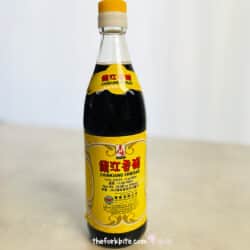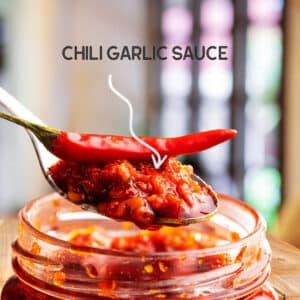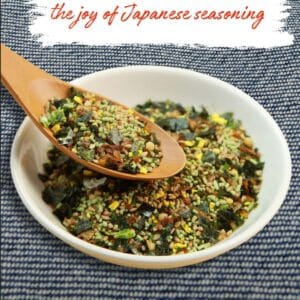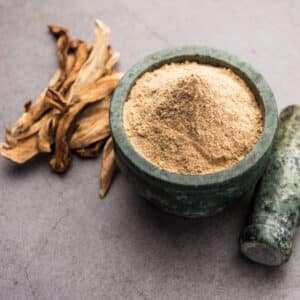Probably not all of us know about the many uses of black vinegar, but have you ever switched to another type of vinegar? At least, that was the case until a few weeks ago I ran out of black vinegar and needed it for a recipe. Based on my research, various kinds of vinegar can substitute for black vinegar. If you're in a similar situation, fret not - a trip to the store isn't necessary! Find a suitable substitute for your needs by reviewing this list.
What is Chinese black vinegar?
As part of Chinese cooking, vinegar is essential and black vinegar is no exception. Chinese black vinegar, specifically Chinkiang (sometimes spelled Zhenjiang), is a type of dark brown-black vinegar made from glutinous rice, millet, wheat, or sorghum. It has a robust aroma and flavor that can range from sweet to sour. There are many ways to use it, including braised dishes, dipping sauces, and a marinade for meats.
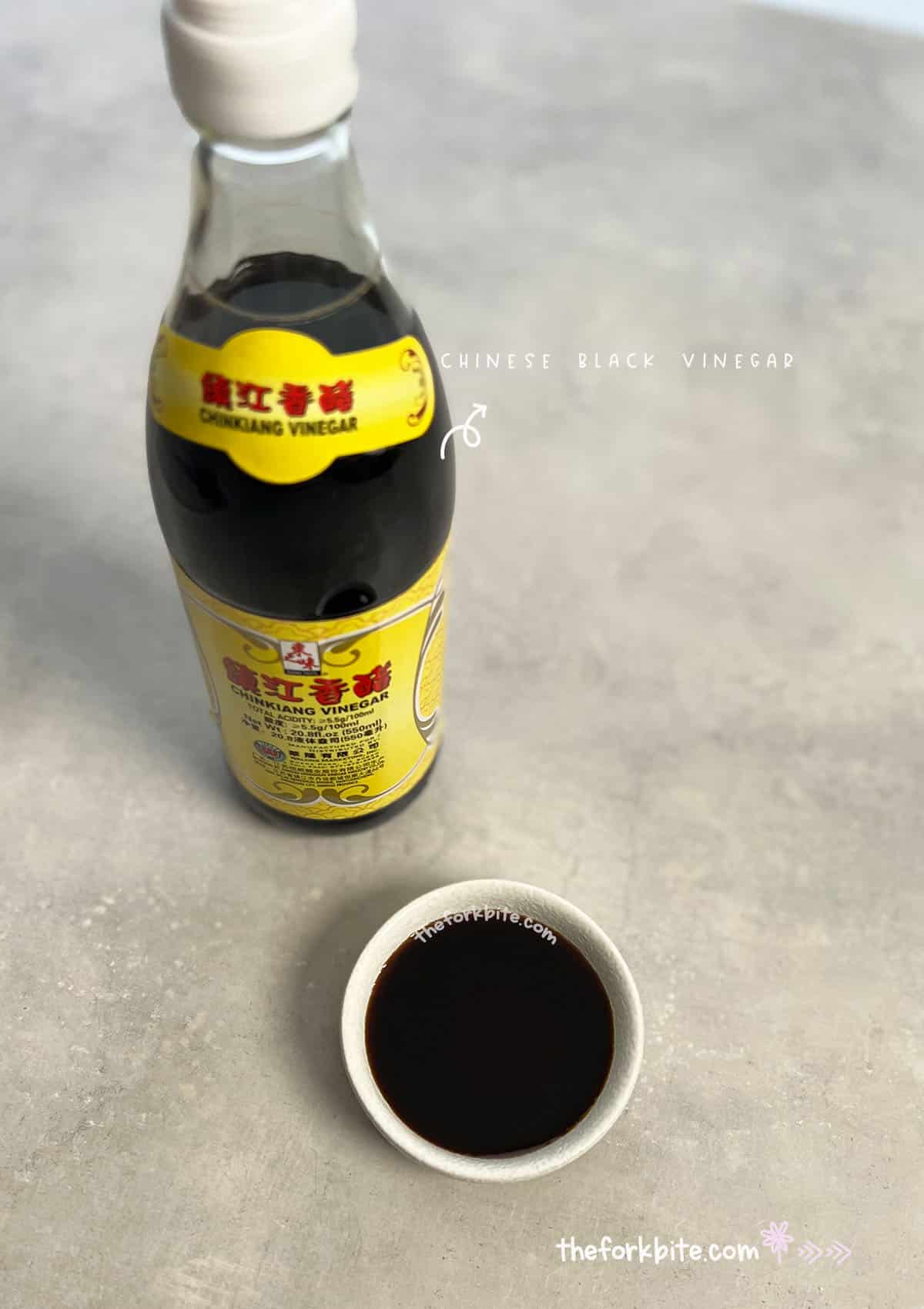
Chinese black vinegar comes in two varieties—plain and sweetened.
Plain black vinegar is your best bet as a versatile dish flavoring ingredient. Its deep, smoky flavor makes it a great addition to marinades, sauces, and stir-fries.
Sweetened black vinegar is a good choice if you're craving something sweeter. It's made with added sugar and flavorings like ginger, giving it a unique taste. The sweetness of it makes it an excellent choice for braised pork, stews, or adding sweetness to savory dishes. Sweetened vinegar, however, will not produce the same results as regular black vinegar.
What's the difference between sweetened vinegar and regular black vinegar?
The flavor profile makes all the difference. Regular black vinegar is much tarter and sour than sweetened black vinegar, resulting in an overly sharp taste if used instead. The sweetened version of black vinegar is flavored with sugar and flavorings, typically ginger, enhancing its sweetness in a way ordinary black vinegar lacks. Aside from this, sugar breaks down meat proteins, making them more tender.
In short, sweetened black vinegar is essential for achieving the right balance of flavors and texture in a dish that regular black vinegar cannot provide. By adding a touch of sweetness, vinegar's tartness is tempered and helps create something extraordinary.
How to use black vinegar?
In my kitchen, I love using black vinegar! From cold appetizers like Tofu Salad or Wood Ear Salad to classic stir-fries with pork belly, it complements all Chinese dishes. The best part is that it's easy to incorporate – add a few tablespoons while cooking and watch your dish transform.
I also like to use black vinegar as a simple dipping condiment for my dumplings or noodles. The tangy, umami flavor of this sauce enhances the taste of every dish I make. For something creative to cook with it, try braising fish or meat in it. As a bonus, the black vinegar adds a touch of sweetness and acidity, adding rich flavor to the dish.
Black vinegar can add a new dimension to your cooking with just a few tablespoons. Give it a try and see how delicious your Chinese recipes can be!
Read:
How does black vinegar taste?
No matter how you use it, whether as a marinade or condiment, Chinese black vinegar will never let you down. The flavor is usually smoky, earthy, and slightly sweet, with hints of licorice. It's also highly versatile — it pairs well with soy sauce, garlic, onion, ginger, chili peppers, and sesame oil to create delectable dishes!
Where to buy black vinegar
There is a vast selection of Chinese black vinegar available in Asian markets and online stores, so if you're looking for something special for your Chinese cooking, this may be a good option. The flavor is intense yet balanced and has multiple uses, so it's worth trying.
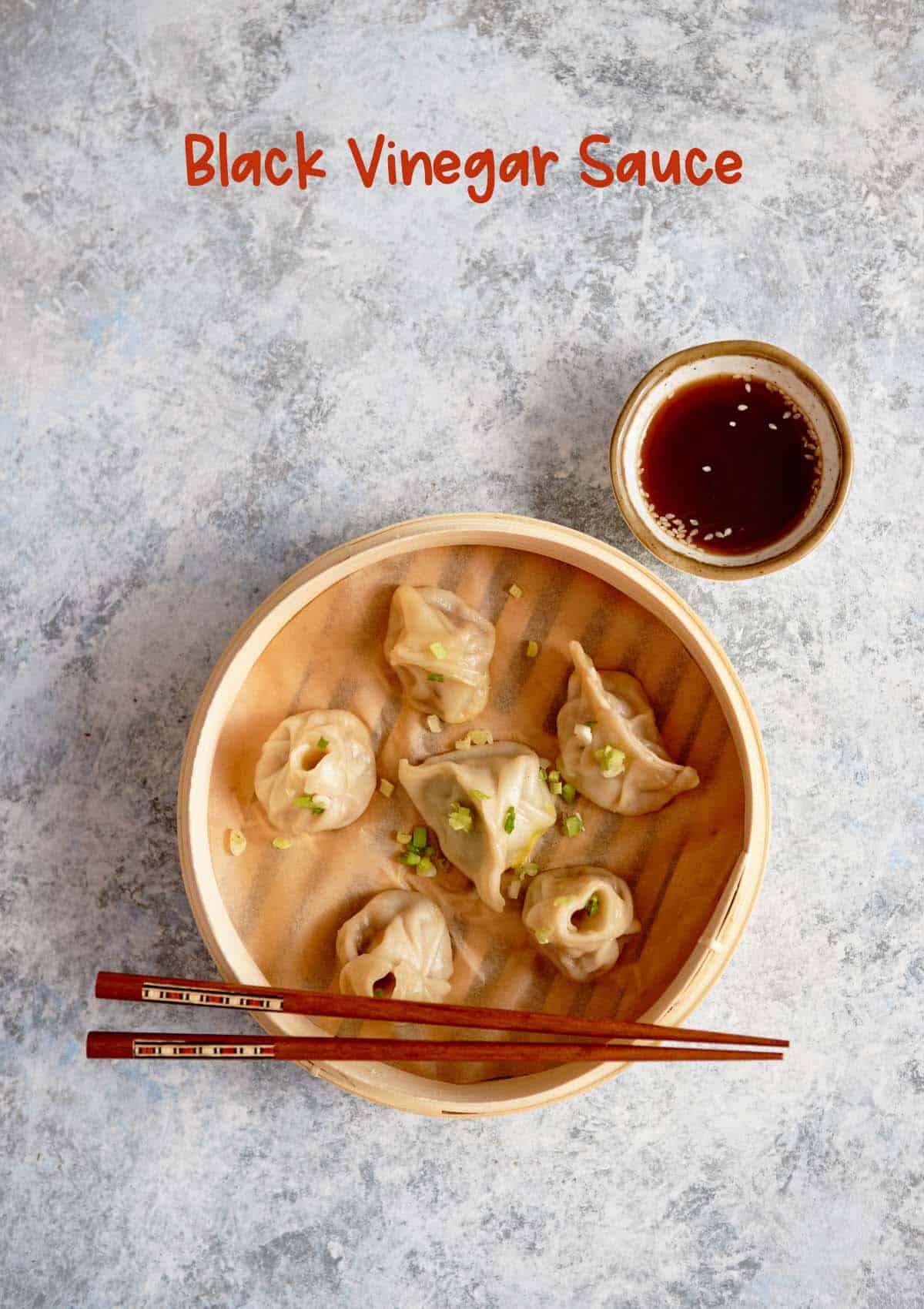
The most common vinegar is Zhenjiang vinegar, sometimes called Chinkiang vinegar, characterized by its dark and robust flavor. Most of the time, I purchase black vinegar from a local Asian market or online versus going to a specialty store.
Black vinegar substitutes
When you're short on ingredients or don't have access to black vinegar, black vinegar substitutes can be a lifesaver. With its sharp, acidic flavor, black vinegar adds depth and complexity to many dishes. It is good to know that there are a few other types of vinegar you can substitute for when you don't have any black vinegar on hand. They will work just as well as the real thing in a pinch.
Here are a few different substitutes that will work just as well in your recipes.
1 Balsamic vinegar
What makes balsamic vinegar a great substitute for black vinegar? Balsamic is made from grape juice aged in oak barrels, so it's a natural fit for most recipes. Plus, the balsamic flavor is more complex than other vinegar, giving dishes added depth and sweetness. Buy high-quality balsamic vinegar since cheap versions may contain white vinegar and coloring that can alter the flavor of your dish.
What does balsamic vinegar taste like?
Trust me; whether you've tried balsamic vinegar or not, it's worth a taste! To me, it's like a dark, sweet symphony. Known for their thick consistency and syrupy texture, they will transport you to a place of culinary perfection. It has an underlying sweetness from the molasses-like notes that make it unique. There's no other vinegar quite like balsamic – its complex flavor is truly one-of-a-kind. Every use of balsamic vinegar takes my recipes to a new level and gives them a distinct aromatic flavor.
How to use it:
One of my favorite ways to enjoy balsamic vinegar is to dress something up with a simple balsamic vinaigrette. You can use it as the star ingredient in some simple and delicious recipes. I love drizzling it on top of various dishes, like Caprese salad, grilled vegetables, and ice cream.
You can also use balsamic vinegar as a marinade for fish or chicken and as a finishing touch on pasta. Regardless of my dish, I enjoy finding unique ways to incorporate balsamic and enjoy its wonderful taste! Depending on your mood, it would be great in desserts like ice cream or poached fruit - the sweetness is in perfect harmony with sweet flavors and creamy textures.
How to substitute balsamic vinegar for black vinegar:
1st option:
1 One part Balsamic vinegar and one part white vinegar.
Instead of using black vinegar, I like to use a combination of balsamic and white vinegar. By mixing them in a 1:1 ratio, the taste is just right—the sweetness from the balsamic adds a great flavor and color, while the white vinegar balances it all out for perfection.
The combination of these two kinds of vinegar does a great job of replicating the taste of black vinegar. Everyone should consider it as a good alternative.
2nd option:
2 One part of Balsamic vinegar and a splash of Worcestershire sauce.
Another alternative I often use in place of black vinegar is a combination of balsamic and Worcestershire sauce. The sweetness of the balsamic is cut by the tangy flavor of Worcestershire, giving any dish a great complement.
I usually start with one tablespoon of balsamic, then add a splash of Worcestershire, depending on the desired flavor. Taste it as you add more, making sure to adjust the amounts until you get the perfect blend. Playing around with proportions can yield interesting results, so don't be afraid to experiment! Your secret ingredient might be hiding in plain sight.
I love combining balsamic vinegar with Worcestershire sauce. It's an easy switch that can offer a delicious twist to your recipes! It's worth a try, and you'll see why I love it!
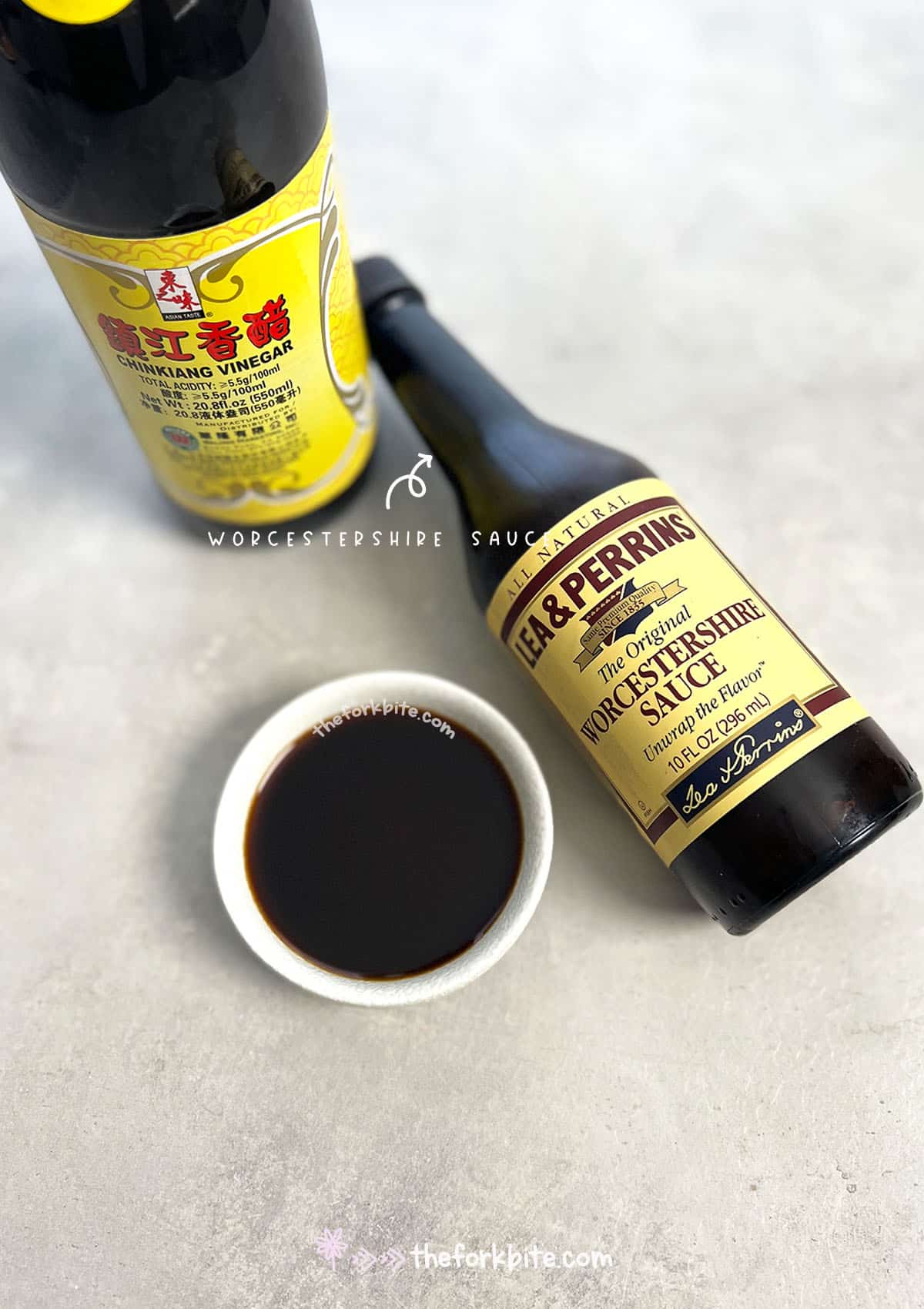
2 Red rice vinegar
For starters, it has a milder taste than black vinegar and is less acidic. Its color adds a lovely hue to the food you are cooking. Like any other vinegar, it can be used to flavor dishes or as an ingredient in marinades or dressings.
Whether you are looking for a milder alternative to black vinegar or want to try something new, red rice vinegar is a great option! Its mild saltiness and moderate acidity lend it well to Asian-inspired cuisine. Additionally, red rice vinegar is excellent for dipping sauces or adding a touch of tartness to sweet and sour dishes.
How to substitute red rice vinegar for black vinegar:
In the absence of this, you can use regular rice vinegar and add a bit of superfine sugar to approximate the flavor. You won't get quite the same taste as authentic black vinegar, but you will still get a sense of the sweet and sour taste.
3 Malt vinegar
Malt vinegar works well as a substitute for black vinegar thanks to its mild, malty taste and light brown color. A slight sweetness makes it a great complement to fried foods like fish and potatoes. You can also use it in sweet-sour marinades, chutneys, pickles (as long as it has at least 5% acidity), and other dishes.
How is malt vinegar made?
There is a long history behind the process of making malt vinegar. First, it involves the germination of barley grains, which involves soaking them in water to encourage sprouting. Following germination, the grains are dried to make malt.
The malt is then brewed into ale and undergoes a second fermentation to turn it into vinegar. Finally, the vinegar is aged briefly to contribute to its distinctive flavor and sharp mouthfeel.
How to substitute malt vinegar for black vinegar:
To achieve the same flavor and taste of black vinegar, use twice as much malt vinegar for every teaspoon of black vinegar specified in the recipe.
To get the desired flavor profile, start with less of each ingredient, and taste the mixture as you go. For instance, if your recipe calls for one tablespoon of black vinegar, swap it for two tablespoons of malt vinegar. Adding a pinch of sugar will help balance the taste and impart some sweetness, as black vinegar has more naturally occurring sugars than malt vinegar.
4 Date vinegar
Date vinegar is an ancient ingredient used in Middle Eastern cooking for centuries. I've always been fascinated by its potential to bring a unique flavor to dishes. Date vinegar was a staple in my grandmother's traditional recipes when I was growing up. She would mix it with lemon juice to make the most delicious salads or marinades.
Date vinegar has an earthy, sweet flavor, unlike any other vinegar. It's versatile and adds to salad dressings, marinades, sauces, and dips. You can even use date vinegar to add depth and complexity to desserts.
Read:
Date vinegar: what does it taste like?
The sweetness of the Date brings out the natural flavors of the grape must and balsamic vinegar, creating a truly unique flavor. It's not just sweet, though – the reduced grape mix creates a thick glaze with a rich caramelized taste that adds depth and balance to the sweetness. All in all, it's an incredibly delicious balsamic vinegar with an extra kick of decadent date flavoring! It's sweet and aromatic, with incredible mellow complexity.
How is date vinegar made?
Date vinegar is made primarily from dates, though you can also use other fruits like figs. The syrup from the pressed and processed dates or sap from the palm trees is boiled until it thickens and becomes a syrup-like consistency. A strainer is then used to remove any impurities before being left to ferment for several weeks, during which time it develops its characteristic sour taste. The vinegar's flavor intensifies as it ages, adding a unique complexity to recipes. After pasteurization, the vinegar is bottled for sale.
The production of date vinegar requires skill and patience, but the results are worth it! Its slight sweetness, earthy aroma, and complex flavor profile make it a versatile ingredient in sweet and savory dishes. Due to its long history of use, date vinegar is sure to become an enduring staple of your cooking repertoire.
How to substitute date vinegar for black vinegar
Date vinegar is similar in color to black vinegar but has a sweeter taste. Substitute it for dishes that require a sweet and acidic flavor. When substituting date vinegar for black vinegar, you should use an equal amount of date vinegar instead of black vinegar. To make the substitution, measure out an equal amount of date vinegar for the dish you are making and use it in place of the black vinegar. The result should be a sweet and tangy flavor!
Read:
How to store black vinegar
Maintaining the flavor and quality of black vinegar requires proper storage! When storing black vinegar, I like to keep it away from direct sunlight. The best place to keep it is a cool, dark place, such as the pantry or kitchen cabinet. Once opened, put the lid or cap back on immediately after using it. Keeping your black vinegar in this state will help preserve its flavor and quality. It's also essential to keep it in a tightly sealed container; this will help prevent it from evaporating or spoiling over time.
Does black vinegar go bad
As a vinegar lover, I've often been curious about this. Fortunately, the answer is no! Because of its acidic nature, black vinegar does not need refrigeration and will remain virtually unchanged over an extended period. Even if there are some changes in color or haze development with other types of vinegar, this is usually only aesthetic and doesn't affect the quality of the vinegar. So, rest assured - your favorite black vinegar will still be safe to enjoy for a long time!
However, you can easily remedy these natural processes if you see signs of cloudiness or sediment. Pour the vinegar through a coffee filter or cheesecloth to remove any formed solids. And even if there is an appearance of something called a "mother" (which looks like a slimy substance), this is harmless and can be used to produce a new batch of vinegar.
So, go ahead and keep your black vinegar on the pantry shelf - it will retain its flavor and properties for years to come! So, whether you dip your sushi or use it in cooking, you can be confident that your black vinegar won't go bad anytime soon.
Chinese Black Vinegar Substitute
Pin RecipeIngredients:
- black vinegar
Instructions:
Balsamic vinegar:
- Option 1: One part balsamic vinegar and one part white vinegar.Instead of using black vinegar, I like to use a combination of balsamic and white vinegar. By mixing them in a 1:1 ratio, the taste is just right—the sweetness from the balsamic adds a great flavor and color, while the white vinegar balances it all out for perfection.
- Option 2: One part of Balsamic vinegar and a splash of Worcestershire sauce.I usually start with one tablespoon of balsamic, then add a splash of Worcestershire, depending on the desired flavor. Taste it as you add more, making sure to adjust the amounts until you get the perfect blend. Playing around with proportions can yield interesting results, so don’t be afraid to experiment! Your secret ingredient might be hiding in plain sight.
Red rice vinegar:
- In the absence of this, you can use regular rice vinegar and add a bit of superfine sugar to approximate the flavor. You won’t get quite the same taste as authentic black vinegar, but you will still get a sense of the sweet and sour taste.
Malt vinegar:
- To get the desired flavor profile, start with less of each ingredient, and taste the mixture as you go. For instance, if your recipe calls for one tablespoon of black vinegar, swap it for two tablespoons of malt vinegar. Adding a pinch of sugar will help balance the taste and impart some sweetness, as black vinegar has more naturally occurring sugars than malt vinegar.
Date vinegar:
- Date vinegar is similar in color to black vinegar but has a sweeter taste. Substitute it for dishes that require a sweet and acidic flavor. When substituting date vinegar for black vinegar, you should use an equal amount of date vinegar instead of black vinegar. To make the substitution, measure out an equal amount of date vinegar for the dish you are making and use it in p
Notes:
How to store black vinegar?
Maintaining the flavor and quality of black vinegar requires proper storage! When storing black vinegar, I like to keep it away from direct sunlight. The best place to keep it is a cool, dark place, such as the pantry or kitchen cabinet. Once opened, put the lid or cap back on immediately after using it. Keeping your black vinegar in this state will help preserve its flavor and quality. It’s also essential to keep it in a tightly sealed container; this will help prevent it from evaporating or spoiling over time.Does black vinegar go bad?
As a vinegar lover, I’ve often been curious about this. Fortunately, the answer is no! Because of its acidic nature, black vinegar does not need refrigeration and will remain virtually unchanged over an extended period. Even if there are some changes in color or haze development with other types of vinegar, this is usually only aesthetic and doesn’t affect the quality of the vinegar. So, rest assured – your favorite black vinegar will still be safe to enjoy for a long time! However, you can easily remedy these natural processes if you see signs of cloudiness or sediment. Pour the vinegar through a coffee filter or cheesecloth to remove any formed solids. And even if there is an appearance of something called a “mother” (which looks like a slimy substance), this is harmless and can be used to produce a new batch of vinegar.Please note that all nutrition information are just estimates. Values will vary among brands, so we encourage you to calculate these on your own for most accurate results.

